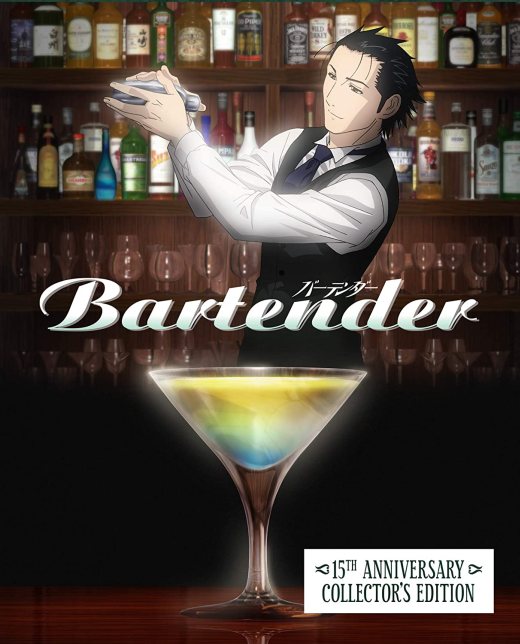
Anime in the popular imagination is…I was about to say Dragonball, but that shows my age. Sailor Moon? One Piece? Inuyasha? Once or twice a decade there’s a show that exists to confine the popular imagination on what anime properly is. But it becomes confined, and defined, largely as fantasy stories about teenagers who do outlandish things while having teenage problems. Or big robots punching each other. Or being hyperviolent or hypersexual or just all around hyper.
And all of these things are true. But they are not the complete picture. There’s an entire subgenre of the medium that is dedicated (perhaps oddly) to the prospect of not much happening at all. Called simply “slice of life”, these shows eschew hyperbole and the extremes that might be associated with anime and, ironically, finds their own extreme in the other direction. In calmness. In specificity of detail at the expense of dramatics. The focus of these shows is often a profession, and in this show’s case, that profession is in the title: Bartender.
Our main character (occasionally hero) is Ryu Sasakura, the bartender whose skill with cocktails is so great, so precise, he is said to “serve the Glass of the Gods”. He’s the solo bartender at Eden Hall, an upper-end establishment in Ginza, Tokyo. It’s the epitome of the exclusive drinkery – heavy wooden door, small plaque with its name designed to be missed if you’re not looking for it. Inside, it’s all hard oak and dim lighting. Behind the bar, there’s an immense store of bottles, reaching toward the ceiling, polished to a high sheen. And Ryu, always ready to prepare for his clientele the perfect drink that will help them shed their problems, find some new conviction, or resolve their personal problems. Because in the world of Bartender, the only thing between you and personal fulfillment is the proper alcoholic beverage.
Bartender tells its story of the glories of spirits in episodic fashion: every episode, there’s somebody (or occasionally a pair of people) who comes into the bar in the midst of a personal crisis. Ryu discerns that through his almost Sherlock Holmes-style powers of observation, and comes up with the simple perfect libation to ease the calm. A man is worried about failing at his job? A Hemingway-style daiquiri will get him to man up. A man regrets never reconnecting with his lost love when she became an actress and he gave up the stage for the world of business? A margarita, my friend. A professor of fluid dynamics is despondent about his lack of worldliness? That man needs a Black Velvet – a combination of champagne and Guinness.
It might be fair to look at this premise and declare it incredibly stupid. Even ridiculous. It’s inherently goofy: the importance placed on the specific chosen drinks by the characters, Ryu’s specificity in choosing them, these are elements rarely in evidence in the typical encounter in a bar. It’s silly.
But on some level Bartender works. First, it doesn’t promise action or adventure. The entire tone of the show is relaxed, laid back, as if one were entering a small, unfrequented bar where the atmosphere is very deliberately subdued. The storytelling, for such small and goofy stories, is surprisingly varied and even a little adventurous. From the beginning, characters are both in and outside of their scenes, narrating their episodes stories as they live them. As the cast of characters builds from story to story, the crew of storytellers grows, so that each subsequent guest in the bar gets a Greek chorus of previous beneficiaries of the bartender art, commenting on their narrative. These slight stories are told in inventive and surprising (if not always entirely engaging) ways.
What they are not is dynamically animated. Bartender is an 11-episode series, and even with that meager episode count, it is clear the budget was strained exceedingly thin. There’s a lot of CGI employed in the animation, and while none of it has the ghastly cluelessness that plagued a lot of early ’00s anime (this show airing in 2006), it’s still pretty glaring. The backgrounds and the bar are attractive, the character animation is very sparse. This is not a visual splendor except perhaps in the depiction of the drinks, which all tend to look delicious.
It might be a backhanded compliment to say Bartender made me want to drink, but it’s true: I was intrigued by the drinks, and by the philosophy of cocktail drinking the show proposed. There’s no advocacy of drunkenness here, and though it posits a strict code of rules for bartenders (all of which seems to me to be a complete load, but pleasant to contemplate), there’s not much of an overarching theme, other than a new perspective on personal problems can find solutions. And that perspective comes from a new flavor, an expansion of the palate. Which is not great drama. Bartender is not scintillating television. It’s more of a warm bath of a show. But that calmness, that slow pace, that lack of action is what a lot of slice of life anime intends. Bartender is unexciting, and that’s just what it wants to be.
Bartender has been released on Blu-ray by Shout Factory. The two-disc release contains only Japanese audio, with English subtitles. Extras on disc include creditless opening and ending, and bumpers. The limited edition also comes with a series of cocktail recipes, and a set of four cardboard coasters.